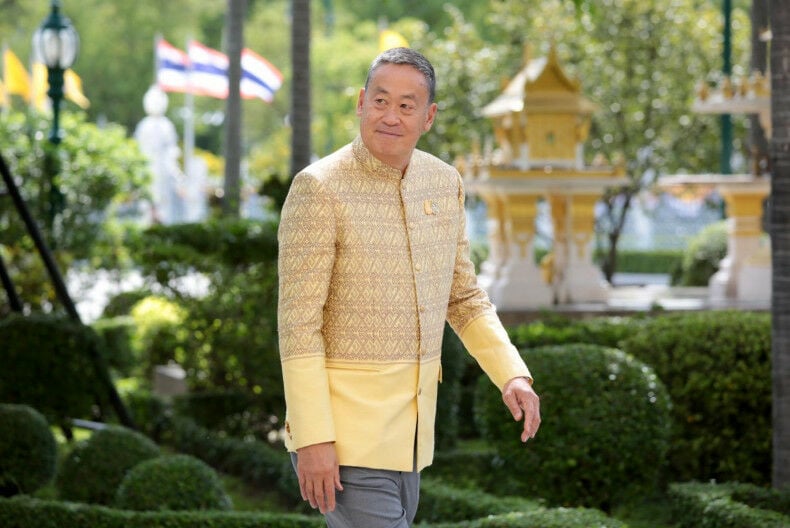Court orders evidence in PM Srettha’s ethics case

The Constitutional Court has thrown the government into turmoil by demanding all parties in Prime Minister Srettha Thavisin’s ethics case submit evidence within 15 days.
The court’s decision came yesterday, setting a new hearing date for July 10 but it remains uncertain whether a ruling will be issued then, leaving the government in a state of anxiety.
The case revolves around the contentious appointment of Pichit Chuenban as a PM’s Office minister during the last Cabinet reshuffle. A group of 40 senators initiated the case, accusing the Thai premier and Pichit of breaching Cabinet minister ethics under Section 160 (4) and (5) of the constitution. They claimed Pichit was unfit for the role, having served jail time for contempt of court during a 2008 bribery case linked to Thaksin Shinawatra.
Pichit resigned before the court accepted the petition, an apparent attempt to shield PM Srettha from legal complications. Consequently, the court dismissed the case against Pichit but proceeded with the case against the 62 year old Thai prime minister, who submitted his defence on June 7.
Legal expert Wissanu Krea-ngam, appointed as an adviser to the prime minister, revealed that the premier’s legal team presented only one witness: Natjaree Anantasilp, the Cabinet’s Secretary-General, citing her comprehensive knowledge of the appointment process. Wissanu refrained from disclosing specifics of the defence, highlighting that ethical standards and integrity were central to the case.
“The terms ‘ethical standards’ and ‘integrity’ have specific definitions in the constitution. There is a formal process for evaluating accusations of ethical breaches. Declaring someone dishonest without due process would disqualify them for life, which is a serious implication.”
Wissanu emphasised that the court’s decision would set a significant precedent, though the timing of the ruling remains uncertain, reported Bangkok Post.
UPDATE: PM Srettha scandal escalates: Court demands more evidence
The Constitutional Court has thrown a curveball in the case against Prime Minister Srettha Thavisin, demanding additional evidence within 15 days. This comes after allegations surfaced regarding his controversial Cabinet appointment, stirring up a storm of legal challenges and political intrigue.
The court’s move sets the stage for a pivotal hearing on July 10, prompting a flurry of submissions from involved parties. A coalition of 40 senators initiated the petition, accusing the 62 year old Thai premier of breaching constitutional and ethical boundaries by appointing ex-lawyer Pichit Chuenban as a minister despite his criminal past.
According to the senators, Pichit’s previous conviction for attempting to bribe Supreme Court officials rendered him unfit for ministerial office under the constitution. In response, PM Srettha submitted a written defence supported by the Council of State and the Cabinet Secretariat, arguing the legality of his appointment.
However, the court’s directive for more evidence signals a potential setback for the Bangkok-born Srettha, compelling all concerned parties to bolster their positions with comprehensive documentation. The outcome of this legal showdown could reshape the political landscape, with implications reverberating across the nation, reported The Nation.
UPDATE: PM Srettha dismisses resignation rumours amid court case
Prime Minister Srettha Thavisin dismissed rumours of his potential resignation or dissolution of the House of Representatives before the Constitutional Court rules on a case that could see him removed from office. The controversy stems from his appointment of Pichit Chuenban as a PM’s Office minister.
“I never think about resignation or a House dissolution. Let the legal procedure take its course. I never think of running away.
“When the judges have questions, I have the duty to explain and respect their decision.”
Srettha revealed that his legal team has already sent a list of additional witnesses to the court.
The case against Srettha was initiated by a group of 40 senators in May, who asked the Constitutional Court to determine if Srettha and Pichit should be removed from office under Section 170 (4) and (5) of the charter, which concerns the ethics of Cabinet ministers.
Pichit stepped down just before the court accepted the petition, a move seen as an attempt to shield Srettha from legal complications. While the court agreed to hear the case against Srettha, it rejected the case against Pichit due to his resignation.
The court has instructed related parties to submit their lists of witnesses and evidence by Monday, with the case scheduled to be heard on Tuesday, June 18.
Srettha could potentially lose his position if the court rules against him. However, his chances of a favourable outcome are believed to have improved after appointing legal specialist Wissanu Krea-ngam as an adviser.
Wissanu, whose initial task was to review the prime minister’s defence, stated earlier in the week that his review covered both factual and legal issues prepared by the prime minister’s secretariat and the Council of State.
The former deputy prime minister clarified that while he did not draft Srettha’s defence, he helped review the documents before their submission to the court.
The appointment of Pichit, who previously served as ex-prime minister Thaksin Shinawatra’s lawyer and Srettha’s adviser, as PM’s Office minister raised questions about his eligibility to serve in the cabinet. Pichit had served jail time for contempt of court related to an attempted bribery case when he represented Thaksin in a controversial land deal case in 2008. On June 25 that year, the Supreme Court sentenced Pichit and two colleagues to six months in prison for attempting to bribe court officials with 2 million baht in cash.
Yuttaporn Issarachai, a political science lecturer at Sukhothai Thammathirat Open University, commented on the significance of the pending Constitutional Court cases.
“The outcome of the court cases could change the political landscape.”
If Srettha is removed from office, parliament will elect a new prime minister, potentially leading to the formation of a new coalition government.
In another case, the Constitutional Court will hear a matter against the main opposition Move Forward Party (MFP) on Tuesday, which could result in the party’s dissolution. If the MFP is disbanded, some of its members may join other parties that could form part of a new coalition government, reported Bangkok Post.
ORIGINAL STORY: EC ordered to present evidence against Move Forward Party
The Election Commission (EC) has been ordered by the Constitutional Court to present its list of witnesses and evidence in the high-stakes case against the Move Forward Party (MFP) before the next hearing on June 18.
The nine judges of the Constitutional Court convened today to deliberate the EC’s petition to dissolve the MFP. The embattled party had already filed its written defence on June 4.
The EC’s petition accuses the MFP of attempting to overthrow the constitutional monarchy and acting in opposition to the democratic system with the King as head of state.
These accusations, according to the EC, violate Article 92 (1) and (2) of the Political Party Act. Central to the EC’s case is a ruling by the Constitutional Court on January 31, which declared that former MFP leader Pita Limjaroenrat’s campaign promise to amend Article 112 of the Criminal Code, known as the lese majeste law, was unconstitutional and could be perceived as an attempt to destabilise the constitutional monarchy.
The EC has demanded the court dissolve the MFP and impose a political ban on its executive board members.
After scrutinising the case, the court instructed the EC to submit a comprehensive list of witnesses and evidence by next Monday, June 17. This development sets the stage for a tense legal battle that could significantly alter the political landscape, reported The Nation.
Latest Thailand News
Follow The Thaiger on Google News:


























